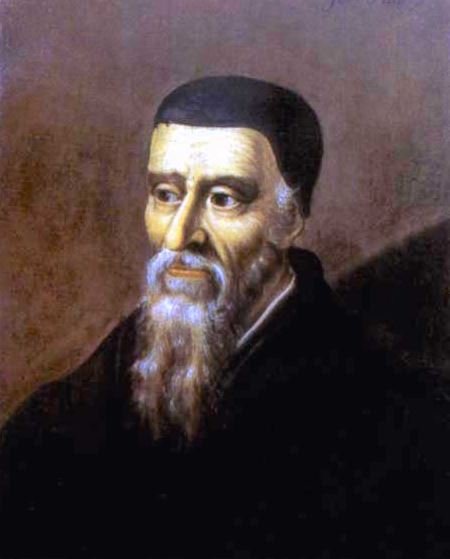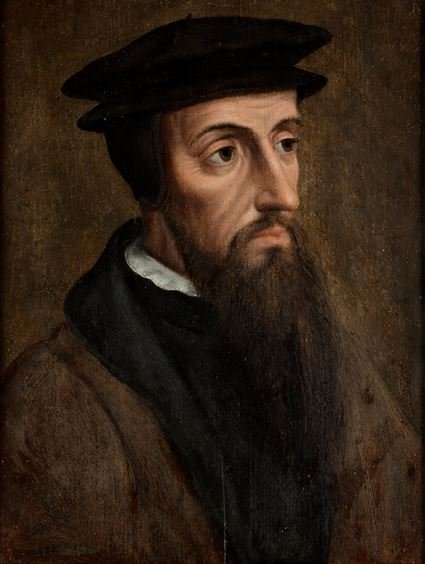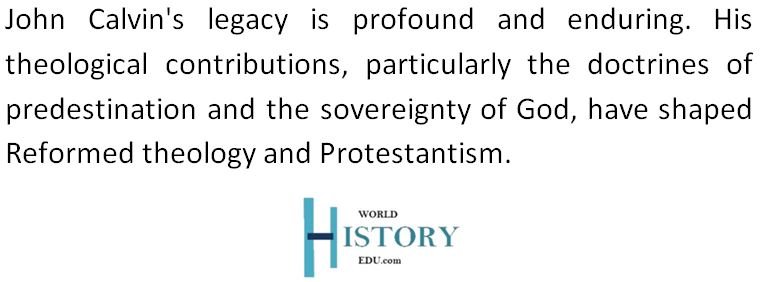John Calvin: The French Reformer and Theologian of the Protestant Reformation
John Calvin (10 July 1509 – 27 May 1564) stands as one of the most influential figures in the Protestant Reformation, a principal figure in the development of a system of Christian theology known as Calvinism. His work emphasized doctrines such as predestination and the absolute sovereignty of God in the salvation of human souls from death and eternal damnation, which have had a lasting impact on various branches of Protestantism including Congregational, Reformed, and Presbyterian churches.
Early Life and Break from the Roman Catholic Church
Calvin was born in Noyon, France, and initially trained as a humanist lawyer. His education and background were instrumental in shaping his analytical approach to theology. Around 1530, Calvin experienced a conversion to Protestantism, a faith that was increasingly in conflict with the Roman Catholic Church. This conversion led to his break from the Catholic Church and set him on a path of reform and theological development.

John Calvin (1509-1564) was a French theologian, pastor, and reformer who played a significant role in the Protestant Reformation. Image: A portrait of Calvin.
History of the Catholic Church: How and When Did Catholicism Begin?
Fleeing to Basel and the Institutes of the Christian Religion
Due to the severe persecution of Protestants in France, Calvin fled to Basel, Switzerland, a city that provided refuge for many Protestant reformers. It was in Basel, in 1536, that Calvin published the first edition of his seminal work, Institutes of the Christian Religion. This work laid the foundational framework for Calvinist theology, addressing key issues such as the nature of God, the doctrine of predestination, and the role of the church. The Institutes would undergo several revisions throughout Calvin’s life, expanding in scope and detail.
The Reformation in Geneva and Strasbourg
In the same year that he published the Institutes, Calvin was persuaded by William Farel to assist in the reform movement in Geneva. His time in Geneva was marked by regular preaching and the attempt to implement reforms in the church and society. However, resistance from the city’s governing council led to the expulsion of both Calvin and Farel in 1538.
Calvin then moved to Strasbourg, where he ministered to a church of French refugees. His experience in Strasbourg was significant as it allowed him to refine his ideas on church government and liturgy, and he forged important relationships with other reformers, such as Martin Bucer. These years also saw Calvin’s continued writing and correspondence, further solidifying his role as a leading theologian of the Reformation.

Calvinism has significantly influenced various Protestant denominations, including Congregational, Reformed, and Presbyterian churches. Image: William Farel (1489 – 1565)
Return to Geneva and Establishing Church Reforms
In 1541, Calvin was invited back to Geneva, where he spent the remainder of his life. Upon his return, he worked tirelessly to implement a new form of church government that included the establishment of a consistory, a body of pastors and elders responsible for church discipline. This period was also marked by the introduction of a new liturgy, which emphasized simplicity and the centrality of Scripture.
Calvin faced significant opposition from powerful families within Geneva, who resisted his reforms and sought to diminish his influence. Despite this, Calvin’s position was solidified through the support of an influx of Protestant refugees and favorable changes in the city’s political landscape.

John Calvin is best known for his development of Calvinism, a system of Christian theology that emphasizes predestination and God’s absolute sovereignty in the salvation of human souls. Image: A 1550 portrait of Calvin.
The Controversial Execution of Michael Servetus
One of the most controversial episodes in Calvin’s career was the trial and execution of Michael Servetus, a Spanish physician and theologian. Servetus, who held heretical views on the Trinity, was arrested in Geneva and tried for heresy. Calvin played a significant role in his prosecution, and despite attempts by some to commute his sentence, Servetus was burned at the stake in 1553. This event has been a focal point of criticism against Calvin, viewed by many as an example of his intolerance and the harsh measures employed in enforcing doctrinal purity.
Final Years and Lasting Legacy
In his later years, Calvin continued to promote the Reformation not only in Geneva but throughout Europe. His influence extended through his writings, which included extensive commentaries on most books of the Bible, confessional documents, and numerous theological treatises. Calvin was also a prolific letter writer, maintaining correspondence with other reformers such as Philipp Melanchthon and Heinrich Bullinger, fostering a network of support and exchange of ideas among the Protestant reformers.
Calvin’s health began to decline in the 1550s, but he remained active in his work until his death in 1564. His theological and ecclesiastical contributions have left a lasting impact on Protestantism, with his teachings forming the basis for various Reformed traditions. Calvinism, characterized by its emphasis on the sovereignty of God, predestination, and a disciplined Christian life, continues to be a major influence in the Christian world.

From his early days as a humanist lawyer to his leadership in Geneva, John Calvin’s contributions to Christian theology and church governance have had a profound and lasting impact, making him one of the most significant figures in the history of Christianity. Image: A painting depicting Calvin during his younger days.
FAQs about John Calvin and Calvinism

What are the core beliefs of Calvinism?
The core beliefs of Calvinism are often summarized in the acronym TULIP:
- Total Depravity: Humanity is completely affected by sin in all aspects of life.
- Unconditional Election: God has chosen certain individuals for salvation based on His will alone, not on any foreseen merit or action.
- Limited Atonement: Christ’s atonement is sufficient for all, but it is effective only for the elect.
- Irresistible Grace: Those whom God has elected will inevitably come to faith and salvation.
- Perseverance of the Saints: Those who are truly elect will persevere in faith and will not permanently fall away.
What was John Calvin’s role in the Protestant Reformation?
John Calvin was a leading figure in the second wave of the Protestant Reformation. He provided a systematic theology for the reform movement through his writings, especially the Institutes of the Christian Religion. He also established a reformed church in Geneva, which became a model for Reformed churches across Europe.
What is the Institutes of the Christian Religion?
The Institutes of the Christian Religion is John Calvin’s seminal work, first published in 1536 and expanded in subsequent editions. It is a comprehensive presentation of Protestant theology, addressing topics such as the nature of God, the role of Scripture, and the doctrine of salvation. It remains one of the most important theological works in Christian history.
How did Calvin’s background as a humanist lawyer influence his theological work?
Calvin’s training as a humanist lawyer provided him with skills in critical thinking, analysis, and systematic presentation, which he applied to his theological work. His legal background influenced his methodical approach to theology and his emphasis on the orderly structure of church governance.
What was the significance of Calvin’s time in Geneva?
Calvin’s time in Geneva was crucial for the implementation and spread of his theological ideas. He established a reformed church that emphasized discipline, moral conduct, and adherence to Scripture. Despite initial resistance and expulsion, Calvin returned to Geneva and successfully implemented his reforms, turning the city into a center of Protestant Reformation.
What happened during Calvin’s conflict with Michael Servetus?
Michael Servetus was a Spanish physician and theologian who held unorthodox views on the Trinity. He was arrested in Geneva and tried for heresy, largely due to Calvin’s denunciation. Servetus was ultimately burned at the stake in 1553. This event is often cited as an example of the harsh measures taken during the Reformation to enforce doctrinal conformity.

Calvin’s writings, including his commentaries on the Bible and theological treatises, were widely read and respected among other reformers. His ideas influenced the development of Reformed theology and church governance, shaping the beliefs and practices of many Protestant denominations worldwide. Image: A painting of Calvin by Italian painter Titian.
What was the nature of Calvin’s correspondence with other reformers?
Calvin maintained extensive correspondence with other reformers, including Philipp Melanchthon and Heinrich Bullinger. These letters were often cordial and supportive, facilitating the exchange of ideas and strategies for advancing the Reformation. Calvin’s correspondence helped to unify the diverse elements of the Protestant movement.
What reforms did Calvin introduce in Geneva?
Calvin introduced significant reforms in Geneva, including the establishment of a consistory for church discipline, the implementation of a new liturgy focused on simplicity and Scripture, and the promotion of education. His reforms aimed to create a disciplined, moral, and theologically sound community.

How did Calvin’s health affect his later years?
Calvin’s health began to decline in the 1550s, but he continued to work diligently until his death in 1564. Despite suffering from various ailments, he remained committed to preaching, writing, and promoting the Reformation.
What were Calvin’s views on predestination?
Calvin believed that predestination was a fundamental aspect of God’s sovereignty. He taught that God had predestined some individuals for salvation (the elect) and others for damnation. This doctrine was intended to emphasize the gracious and unmerited nature of salvation.
How did Calvin’s work influence education?
Calvin strongly advocated for education, believing that a well-educated clergy and laity were essential for a healthy church. He helped establish the Academy of Geneva, which trained ministers and laypeople in theology and the humanities, contributing to the spread of Reformed ideas.

Calvin’s biblical commentaries were extensive and detailed, covering most books of the Bible. They provided an exegesis that was accessible to both scholars and laypeople, emphasizing the plain meaning of the text and its application to Christian life. A painting depicting the last days of Calvin.
How did Calvin’s theology address the role of the church in society?
Calvin believed that the church should play a central role in society, promoting moral behavior and social justice. He advocated for a close relationship between church and state, where civil authorities supported the church’s mission and upheld Christian values in public life.
What were Calvin’s contributions to liturgy and worship?
Calvin introduced a simplified liturgy that focused on the preaching of the Word and the administration of the sacraments. He emphasized congregational singing and the use of the Psalms in worship. His liturgical reforms aimed to make worship more accessible and focused on the essentials of faith.

John Calvin’s model of church governance and emphasis on moral discipline continue to influence Christian practice and thought. Calvinism remains a significant force in global Christianity. Image: An artwork depicting Calvin during his early 50s. This work was done by French artist René Boyvin.
How did Calvin view the relationship between faith and works?
Calvin taught that salvation is by faith alone, but true faith is always accompanied by good works. He believed that good works were evidence of genuine faith and the work of the Holy Spirit in a believer’s life, not a means to earn salvation.
What impact did Calvin’s theology have on economic and social life?
Calvin’s emphasis on hard work, frugality, and stewardship influenced economic and social life in Geneva and beyond. His teachings encouraged a disciplined, industrious lifestyle and contributed to the development of a Protestant work ethic that has been associated with economic success and social stability in many Protestant communities.
























